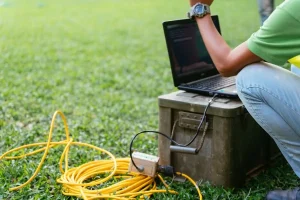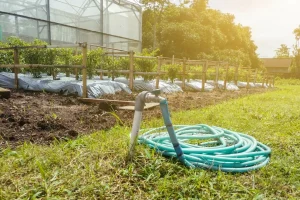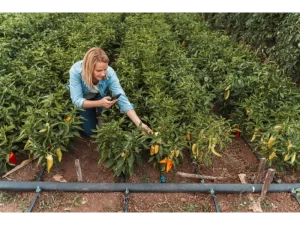The question of what smart irrigation is frequently arises in the fields of agriculture and landscaping. It is also an important technology in terms of the efficient use of water resources. Therefore, it is much more economical than traditional irrigation methods. In this way, water is provided according to the needs of the plants. This prevents water waste and increases efficiency. In addition, automatic control is possible thanks to sensors and software. Therefore, the system works without the need for manual intervention. This also saves time. Furthermore, soil moisture, weather conditions, and plant type are taken into account. This ensures that irrigation is carried out in the right amount and at the right time. The system can also be controlled via smartphones or computers. This provides remote management capabilities. This reduces water costs and improves product quality. It also enables the development of an environmentally friendly irrigation approach.
Table of Contents
- Water Use Efficiency with Smart Irrigation
- What is Irrigation Optimization?
- What are Irrigation Optimization Systems?
- How Does Irrigation Optimization Work?
- How Do Smart Irrigation Systems Save Water?
- Conclusion
- Frequently Asked Questions
Water Use Efficiency with Smart Irrigation
Smart irrigation can significantly increase water use efficiency. These systems also offer effective solutions for conserving water resources. Therefore, they are much more economical than traditional irrigation methods. This ensures that only the necessary amount of water is used. In this case, both waste is prevented and efficiency is increased. Additionally, sensors continuously monitor soil moisture and weather conditions. Therefore, irrigation timing is set correctly. This way, plants receive water at the most appropriate time. Furthermore, over- or under-watering is prevented. This preserves product quality and increases yield. Moreover, automation systems reduce the need for manual control. This saves farmers time and labor. This way, larger areas can be easily managed. Additionally, the systems can be controlled remotely via mobile applications.

What is Irrigation Optimization?
The question of what irrigation optimization is is quite important for those seeking efficiency in agriculture. It also means using water at the right time and in the right amount. This saves resources and protects plant health. In this way, yields increase and costs decrease. Furthermore, soil structure, plant type, and weather conditions are analyzed. Therefore, irrigation decisions are made based on data. This prevents over- or under-irrigation. Moisture sensors and weather forecast data are also integrated into the system. In this case, irrigation time and amount are optimized. Furthermore, automation systems simplify control processes. This minimizes human error. This saves time and labor. Water usage efficiency is also significantly increased. This makes agricultural production more environmentally friendly. This supports sustainable agricultural practices.

What are Irrigation Optimization Systems?
What are irrigation optimization systems? This question is frequently asked in modern agriculture. These systems are technologies developed to use water efficiently. Therefore, unnecessary irrigation is prevented, and resources are conserved. This increases yield and reduces costs. Furthermore, soil moisture, weather conditions, and plant needs are analyzed. Therefore, irrigation decisions are made based on data. This ensures that plants are watered at the right time and in sufficient quantities. It also reduces the risk of over- or under-watering. In this case, product quality and agricultural success increase. Furthermore, sensors and software work in integration with the system. This reduces the need for human intervention. This saves on labor costs. It also offers easy control thanks to remote access. This allows users to monitor irrigation at any time. It also supports sustainable agricultural practices. This reduces water consumption and protects the environment.

How Does Irrigation Optimization Work?
The question of how irrigation optimization works is quite important in terms of efficient agricultural practices. These systems also analyze soil and plant data in real time. Therefore, the amount and timing of irrigation are determined automatically. This prevents unnecessary water usage. Additionally, moisture sensors, weather conditions, and plant needs are evaluated together. In this case, plants are given only as much water as they need. Furthermore, the irrigation process can be remotely controlled through automation. This saves time and labor. Users can monitor system data in real-time. The risk of incorrect irrigation is minimized. This preserves product quality and increases yield. Soil erosion and nutrient loss are also prevented. Consequently, environmental impacts are reduced.

How Do Smart Irrigation Systems Save Water?
The question of how smart irrigation systems save water is frequently asked. These systems use water only when needed and in the required amount. This prevents waste and increases efficiency. In this way, both nature is protected and costs are reduced. Furthermore, soil moisture and weather conditions are continuously monitored with sensors. In this case, the irrigation decision is made based on data. An irrigation plan is also created according to the plant type. This prevents over- or under-watering. In this way, plants grow evenly, and product quality increases. The systems can also be controlled remotely. This saves time and labor. Furthermore, irrigation is automatically regulated and monitored. This minimizes the risk of human error. This supports sustainable agricultural practices. It also provides long-term economic benefits.
Conclusion
In conclusion, the question “What is Smart Irrigation?” is important for those seeking efficiency and sustainability in agriculture. These systems optimize water usage and prevent waste. Furthermore, data-driven decisions ensure that plants are watered at the right time. This improves product quality and reduces costs. The answer to the question “What is Smart Irrigation?” is an environmentally friendly farming method that utilizes technology correctly. Therefore, it is solidifying its place among the agricultural practices of the future.
Frequently Asked Questions
How do smart irrigation systems use water efficiently? They provide only as much water as needed using moisture sensors and climate data.
Why is water usage efficiency important? It conserves resources, reduces production costs, and lowers environmental impact.
Where can it be applied? It can be used in agriculture, landscaping, greenhouses, and urban green spaces.
How does the system collect data? Sensors measure soil and environmental conditions and convert them into data.
How are irrigation decisions made? Software determines irrigation timing and quantity based on sensor data.
Is human intervention required? It is minimal; most systems can be managed remotely.
What technologies do smart irrigation systems use? Sensors, weather data, automation, and remote access software are used.
How do plant species affect water use efficiency? Each plant has different water requirements; the system irrigates according to these needs.
How are efficiency measurements taken with smart irrigation? Soil moisture, irrigation frequency, and water consumption are reported through the system.
Is smart irrigation effective in small-scale agriculture? Yes, it provides significant water and energy savings even in small areas.








